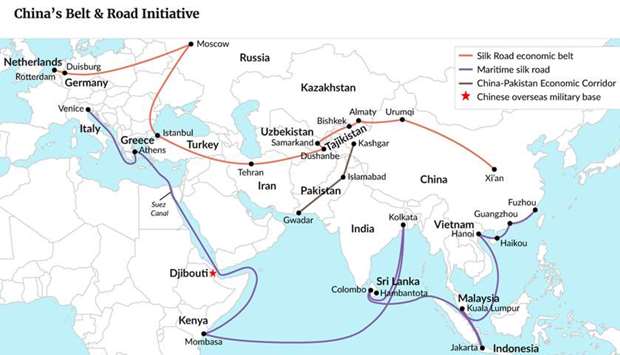Qatar, which has a preeminent position in the Middle East, has a key role to play in the Belt and Road Initiative, a development strategy adopted by the Chinese government involving infrastructure development and investments in Europe, Asia and Africa.
"Qatar's position in the region helps it to play an important role in the Belt and Road Initiative, especially with its economic and geographical components," said Gui Hanfeng, chairman of Global Economic Development Forum (GEDF), a global platform to bolster co-operation as well as economic, trade and cultural co-ordination among nations.
The statement assumes significance considering that the Qatar Chamber (QC) last year signed a memorandum of understanding with the China Council for the Promotion of International Trade to join the Silk Road Business Council.
The presence of shipping lines between the two countries contributes to the growth of economic relations, and also supports investment opportunities between them, he said, adding the 2022 FIFA World Cup and the Qatar National Vision 2030 make it an ideal environment for attracting investment, which is expected to see progress and prosperity under these incentives.
Highlighting that the previous GEDF editions were held at China, Australia, Malaysia and Germany; Gui said the fact that Doha was chosen for this year's meet shows the strength of the relations between Qatar and China.
Both Qatari and Chinese side Monday reviewed the investment and economic opportunities and the business environment available to them through B2B meetings between businessmen from both sides and participants in the forum.
QC first vice chairman Mohamed bin Towar al-Kuwari urged Chinese and Qatari companies to benefit from the encouraging investment climate and the incentive laws to increase the volume of co-operation and enter into partnerships and projects, to take advantage of the Belt and Road Initiative, which aims to revive and support trade between China and the Arab countries and re-export to Europe.
He said bilateral relations between Qatar and China have witnessed great progress at all levels and in all areas of political, economic, cultural and sports co-operation since the establishment of diplomatic relations in 1988.
Terming that China as an important trade partner of Qatar, al-Kuwari said the trade exchange between the two countries reached about $10.4bn in 2017 and that there are about 190 Qatari-Chinese companies operating in Doha with a total capital of QR1.4bn.
Qatar opened last year a centre for the settlement of transactions in Chinese currency (renminbi), the first of its kind in the Middle East, in addition to the launch of the direct shipping line between Hamad Port and Shanghai, to promote trade and investment, al-Kuwari pointed out.
He stressed that the private sector in both countries would play a bigger role in the future of economic relations between Qatar and China, especially in view of abundant investment and business opportunities.
The statement assumes significance considering that the Qatar Chamber (QC) last year signed a memorandum of understanding with the China Council for the Promotion of International Trade to join the Silk Road Business Council.
The presence of shipping lines between the two countries contributes to the growth of economic relations, and also supports investment opportunities between them, he said, adding the 2022 FIFA World Cup and the Qatar National Vision 2030 make it an ideal environment for attracting investment, which is expected to see progress and prosperity under these incentives.
Highlighting that the previous GEDF editions were held at China, Australia, Malaysia and Germany; Gui said the fact that Doha was chosen for this year's meet shows the strength of the relations between Qatar and China.
Both Qatari and Chinese side Monday reviewed the investment and economic opportunities and the business environment available to them through B2B meetings between businessmen from both sides and participants in the forum.
QC first vice chairman Mohamed bin Towar al-Kuwari urged Chinese and Qatari companies to benefit from the encouraging investment climate and the incentive laws to increase the volume of co-operation and enter into partnerships and projects, to take advantage of the Belt and Road Initiative, which aims to revive and support trade between China and the Arab countries and re-export to Europe.
He said bilateral relations between Qatar and China have witnessed great progress at all levels and in all areas of political, economic, cultural and sports co-operation since the establishment of diplomatic relations in 1988.
Terming that China as an important trade partner of Qatar, al-Kuwari said the trade exchange between the two countries reached about $10.4bn in 2017 and that there are about 190 Qatari-Chinese companies operating in Doha with a total capital of QR1.4bn.
Qatar opened last year a centre for the settlement of transactions in Chinese currency (renminbi), the first of its kind in the Middle East, in addition to the launch of the direct shipping line between Hamad Port and Shanghai, to promote trade and investment, al-Kuwari pointed out.
He stressed that the private sector in both countries would play a bigger role in the future of economic relations between Qatar and China, especially in view of abundant investment and business opportunities.


